Toggle Background Color
In the annuls of history, often it has been the smallest of groups, or in many cases, one individual, who has made decisions that have altered the course for thousands, if not millions of people. From the days we emerged from the ancient lands of Africa to the modern day, these groups have had a profound impact on the course of events that have shaped our lives. Some have impacted in large ways, others in very small, almost insignificant ways. To examine this, let us look at one dynasty, in one time period?
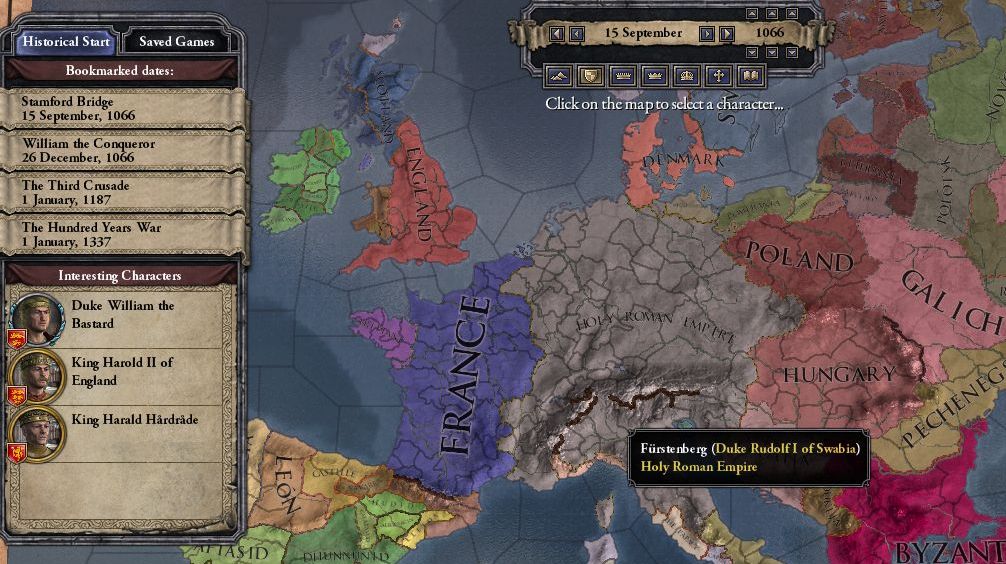
To begin this examination, we must first go to Europe in 1066 A.D. The lands of Europe and the Middle East are on the precipse of change. Already in England, an invader from the mainland threatens the crown of the Island nation, while in Spain ,the Christen Kings fight for survival. However, our examination is not on those two lands, but rather on a small dukedom in the Holy Roman Empire?
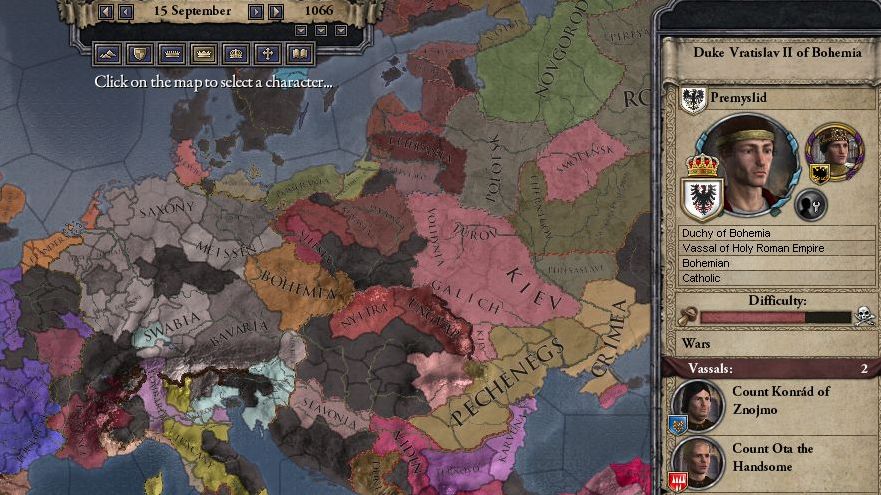
Specifically the Dukedom of Bohemia, held by the small Premyslid family. Subjects of the Holy Roman Empire, yet not ethnic Germans, the people of Bohemia, have often felt like outsiders in the Holy Roman Empire. To see the impact this small dukedom might have on the world though, we must start at the beginning?
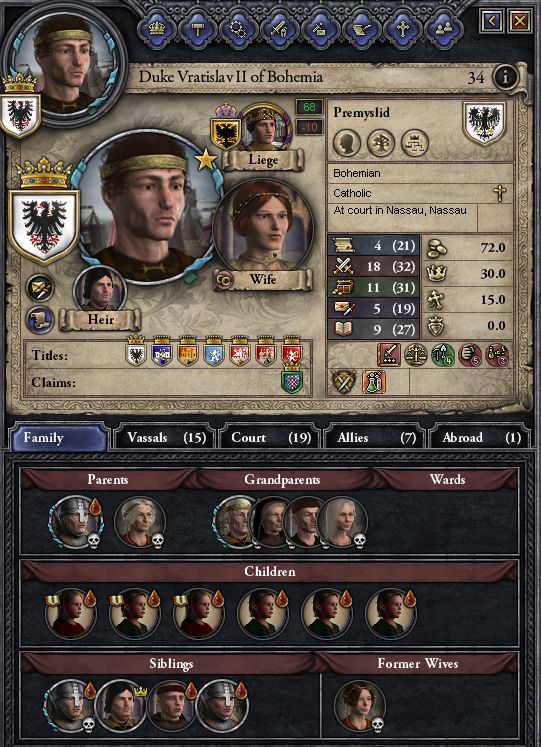
Duke Vratislav the Second could in many ways be described as the stereotypical warrior king. Well learned in the ways of the sword, as well as being well versed in the general strategy of war, few in the Empire could match the Duke for his combat prowess. Short tempered, Vratislav had little patience for the nuance of Intrigue and spying, as well as the well versed words of diplomacy. In the eyes of Duke Vratislav, everything should be straightforward and to the point, whether it be the arts of negotiation, or settling affairs in court. Indeed, records show that Vratislav had inflamed many minor nobles against him when he sided with peasants in the court.
However, despite his lofty attempts at fair rule, Vratislav?s main weakness was for coin. He was known to squeeze as much out of taxes as possible, and would absolutely refuse to pay for anything unless he truly desired it.
While he was stingy with his coin, Vratislav was quite fruitful in his endeavors to expand the royal blood line. Between his first, deceased wife, and his current duchess, he managed to produce six children by the year 1066.
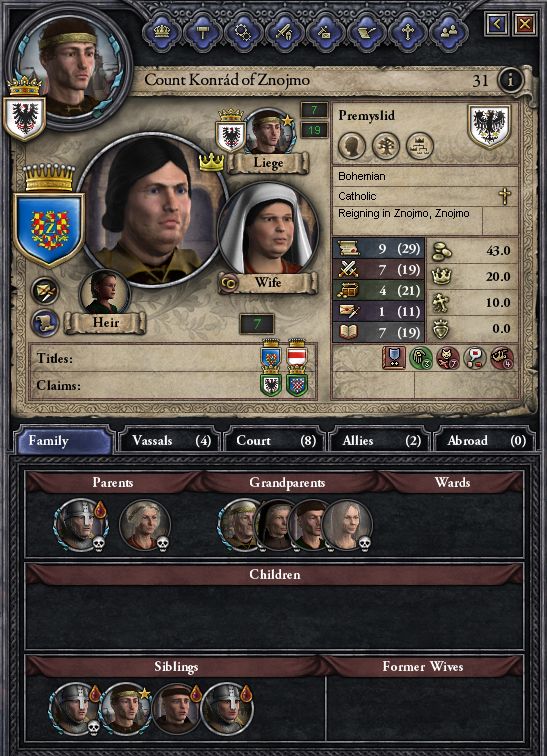
Sharing power with the king was his three brothers. The first was Konrad, count of Brno and Znojmo. Konrad was an average, if lazy man who had an undeservedly high opinion of himself. However, in the company of his brother, he was known for his blunt honest and among his peasants, he was known for his many charitable works dedicated to improving their lot in life.
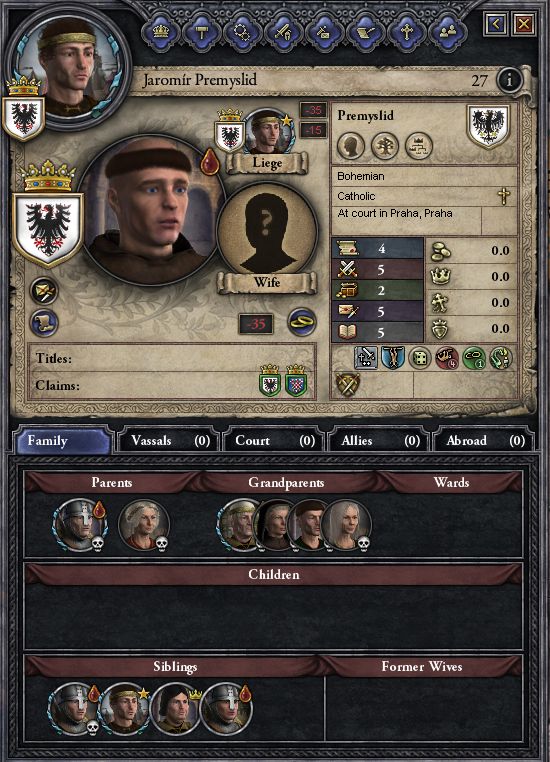
The groups middle brother was Jaromir, a relatively unskilled and lazy man, who was known mainly for his courageous hunts, and his rigorous study and dedication to the Bible. However, outside his two pursuits, he was known to be a random man who was rather difficult to get along with, and who never seemed to keep things organized. These were perhaps the reasons he alone, out of all his brothers, received no land
to call his own.
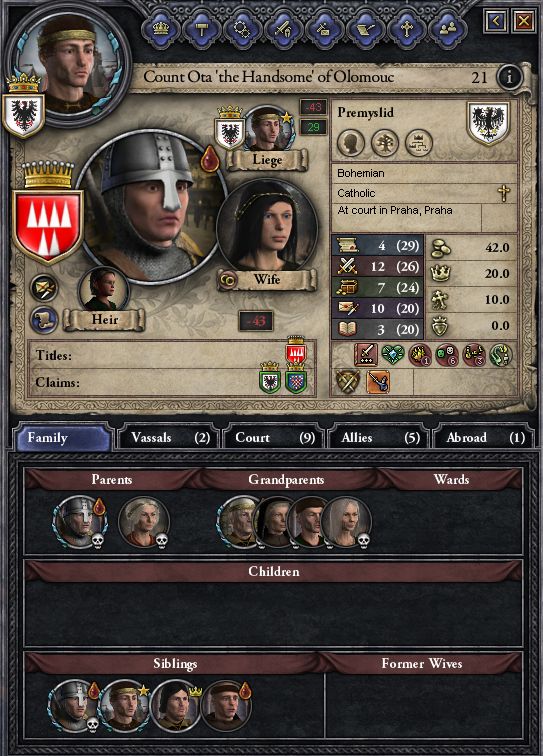
Vartislav?s final brother was the youngest; Ota, Count of Olomouc. Ota was similar to Vartislav in many ways, both were short tempered warriors whit ha weakness for coin. However, while the Duke had no shortage, Ota?s bravery was known to be even greater than that of his brothers. According to legends, he once charged at a bear with nothing but a hide shield and a short sword. In addition, his natural good looks made him a popular subject with many of the women in the realm, several of who he was rumored to have had affairs with. However, Ota?s biggest shortcoming was his jealousy of his older brother Vartislav. In Ota?s eyes, he, not his elder brother, was the rightful ruler of Bohemia, and he made no secret his murmurings of rebellion against the duke. However, Ota?s knowledge of military matters made him a valuble addition to the Duke?s small council.

Helping to govern with the Duke was his small council, a group of five men who specialized in various aspects of governing, and who?s assistance made ruling the land easier.

Handling diplomatic matters was Bishop Tobias, a kind outgoing man known for his usual fairs sense of justice, as well as his well-trained sense of self restraint.

Handling economic matters was Baron Vilem. A mathematical genius and desire to hold onto coin made him a valuable addition to the council. He was also extremely loyal to the Duke who helped to cover up an incident with a prostitute that left the Baron with a strong sense of self restraint, and a horrible case of Syphilis.

Covering the dark seedy underworld was Baron Ojir. Known for his infinite patience as well as his courage in facing those who thrived in the less than legal underbelly of Prague, Ojir made himself a reputation for his absolute trust in his contacts, although his contacts may not have been as reliable as he believed.

Rounding out the council was Bishop Prokop. A generous, pious man who had made a name for himself for his tireless attempts in his youth to try and convert pagan villages in the Baltic.

A sixth, unofficial member also had the Kings ear, if only in a very informal manner. The Dutchess Swietoslawa, Princess of Poland and mother of 3 of the Dukes six children. A zealous woman known for utilizing many random techniques in her attempts to convert pagan, she was quite ambitious, but lacked the knowledge or bravery to act upon her ambitions.

Ruling over Duke Vartislav was young Kaiser Heinrich the Forth. Having ascended the Imperial throne several months earlier, the Kaiser had made waves by his reluctance ot go to church, although he stood firm is the fact of criticisms levied against him but high church officials. He honestly explained his reluctance to believe in some of the creeds preached by the church, but promised that they would not impact him from his duties as monarch. In fact, him many kind acts to his subjects seemed to be in compensation for his irregular church attendance.

In the Month of September, Duke Vartislav met with his council to discuss plans and management for the Duchy. To improve relations with the new Kaiser, Bishop Tobias was dispatched to the imperial court at Nassau.

Ota was to remain in Prague where he could raise additional troops for the land, and so his brother could have Ojir keep a close eye on him. Vilem meanwhile toured Prague?s countryside collecting taxes, and squeezing out every last copper piece he could. Bishop Prokop was dispatched to Rome to improve relations between the Duke and Pope Alexander the Third.

Before dispatching his council, Vartislav inquired into improvements that could be made to the Duchy capital. Several, of the councilmen, Vilem in particular, recommended saving the treasury for several years to finance several larger projects. Wanting to hold onto his money, the Duke was all to happy to agree.

The Council also examined Bohemia?s position in the world and they grimly concluded that they were in a difficult spot. To the East were Hungary and Poland, two large powers that could easily overwhelm Bohemia if not for the protection of the Holy Roman Empire. However, the Empire it?s self could easily crush the Duchy if it fell out of line. The Council concluded that expanding Bohemian power would be difficult, and even holding onto what they had would be a challenge if any of the three power decided they wanted the Duchy.

The Council also began a slow process of recruiting artisans and scholars to expand the Duchy?s knowledge in several fields for engineering and thought.

Scarcely a day after his councilmen depart, Vartislav is call to the Imperial Court to begin training more recruits for the army. While reluctant to leave Prague and accept the Kaiser?s position as Marshall, the Duke saw little choice and secretly hoped he could learn more about the main imperial units.

A few weeks after arriving at the Court, the Kaiser called a vote among hi nobles, seeking to increase his power and control over his vassals. Seeing little reason to give Heinrich more power, Vartislav ignores the vote, noting that his absence counts as a nay.

In Prague meanwhile, Count Ota enjoys a small amount of success in recruiting and training additional men for the Prague levy. Secretly, Ota hopes that these men will prove to be more loyal to him, their trainer, than to his brother, their ruler who is away.

A month after leaving for the Imperial court, Duke Vartislav sent a courier racing back to Prague as fast as possible, as soon as he arrived, Count Ota, and Baron?s Ojir and Vilem read the letter sent by their lord. According to the Duke, the Kaiser had declared a holy war against the pagans in Mecklenburg . Already, the Kaiser was mobilizing his levies, but it would only be a matter of time before his vassals levies were raised too. While he was commanding the levies in the Imperial Court, his councilmen back in Prague were to mobilize the Ducal levies and utilize the troops however they saw fit.
Immediately, the three men began to strategize. There was now clearly an opportunity to gain prestige, and even gold or possibly land, the question was how to acquire it in this war. Count Ota reported that even with raised levies, Bohemia could at most mobilize fifteen hundred soldiers, including the levies of himself and his brother, and the Count made no secret his desire to keep that from happening. Baron Ojir also pointed out that with that small amount of men, Bohemian gains would be minimal. Finally after several hours of debate, Baron Vilem pointed to the map and laid his finger on the county of Wolgast. The Holy war declared by the Kaiser didn?t cover this region, with careful maneuvering Bohemia could potentially capture this county. However, the problem would be in the aftermath of any potential victory, would be the governing of the land. Given it?s distance from Bohemia, anyone there would have less of an effect on court politics, and few would be willing to leave such posts.
Ota quickly came up with a solution. His brother Jaromir. Jaromir was currently landless and he was the least skilled out of the three brothers. If given the land, he would be out of the Courts way, where he could do potential damage, and would in essence, be on his own. In addition, being the Duke?s brother would give a sense of legitimacy to any newly established lands acquired. Finally Jaromir?s loyalty to the Duchy was certain, so there would be no worry in the short term of rebellion. Finally agreeing on a plan, the ducal levies were called up and sent to rally at Lausitz, a small province south of Brandenburg. It was decided that Jaromir would lead the center column of troops, to add to his perceived legitimacy when they would take control of Wolgast and to assure the troops that their future leader wasn?t one to shy away from a fight. Ota stayed by his brother?s side, giving his advice for the coming battles and to provide a shield arm to protect his older brother.

While the levies rallied, the Kaiser called upon his vassals to contribute levies to the Imperial. Since the ducal levies of Bohemia had already been raised, they were exempt from this call.
 After the troops at Lausitz were assembled, the army of Bohemia began it?s long march to Wolgast. The army would have to go around Brandenburg to avoid the Pagan army laying siege to the province. In two month, the Army would be at the Baltic, awaiting their fortunes and destiny.
After the troops at Lausitz were assembled, the army of Bohemia began it?s long march to Wolgast. The army would have to go around Brandenburg to avoid the Pagan army laying siege to the province. In two month, the Army would be at the Baltic, awaiting their fortunes and destiny.























 After the troops at Lausitz were assembled, the army of Bohemia began it?s long march to Wolgast. The army would have to go around Brandenburg to avoid the Pagan army laying siege to the province. In two month, the Army would be at the Baltic, awaiting their fortunes and destiny.
After the troops at Lausitz were assembled, the army of Bohemia began it?s long march to Wolgast. The army would have to go around Brandenburg to avoid the Pagan army laying siege to the province. In two month, the Army would be at the Baltic, awaiting their fortunes and destiny.